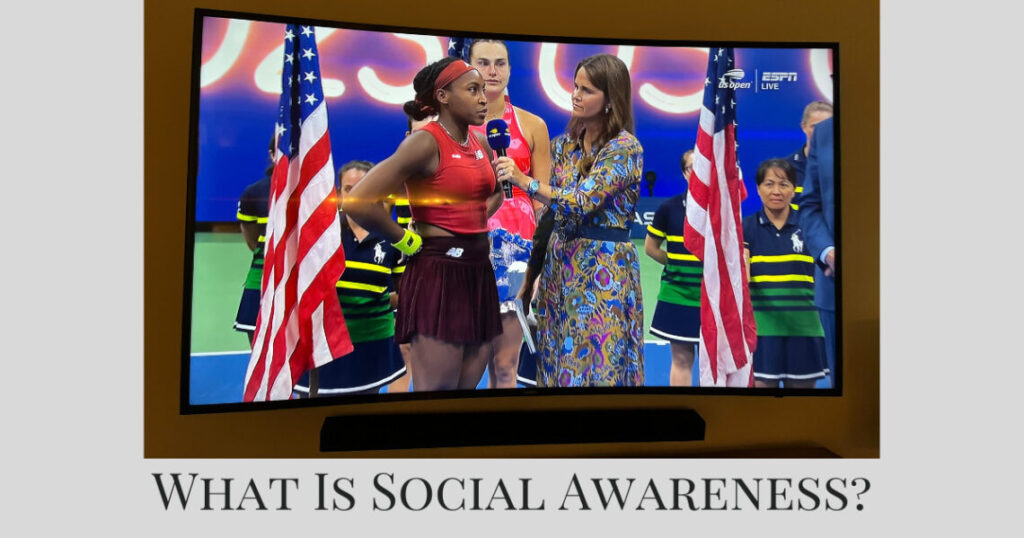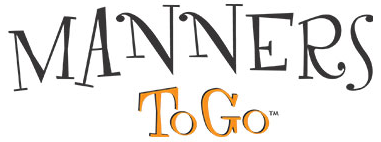
Social awareness refers to the ability to understand and recognize the various social, cultural, and societal issues that affect individuals and communities.
It involves being attuned to the world around you, empathizing with the experiences and perspectives of others, and being informed about the broader social and cultural context in which people live. Social awareness encompasses a wide range of knowledge and skills.
Did you watch the US Open? I did and was touched by Coco Gauff in so many ways.
Yes, I was impressed by her athleticism but mostly for me it was her sportsmanship, responsibility and grace.
Coco Gauff, Manners Etiquette and Using Grace
As she accepted her trophy, she recognized her family – especially her parents, the audience and she was relatable.
Coco demonstrated personal power, self-respect, respect for others and she was socially aware.
As etiquette experts, it is our responsibility to tell stories and share positive examples that children find interesting and can relate to in the moment.
Coco’s story is uplifting and a good example of how to be in everyday life. During the entire tournament she demonstrated the meaning of being responsible, emphatic, patient all while being graceful
Here Steps to Being Socially Aware While Teaching Manners
- Understanding Social Issues: Being aware of and informed about important social issues
- Empathy: Empathy is the ability to understand and share the feelings and perspectives of others. Social awareness involves empathizing with people who may be facing challenges, discrimination, or injustice.
- Cultural Competence: Being sensitive to and knowledgeable about different cultures, customs, and traditions. This includes respecting diversity and understanding how cultural factors can influence people’s lives.
- Current Events and News: Staying informed about current events, news, and developments in society. Being aware of local, national, and global issues helps individuals understand the broader context in which they live.
- Community and Social Dynamics: Understanding the dynamics within communities, including issues related to community development, social cohesion, and community well-being.
- Social Responsibility: Acknowledging our role in society and the ethical obligation to contribute positively. This may involve volunteering, charitable giving, or engaging in activism.
- Community and Social Dynamics: Understanding the dynamics within communities, including issues related to community development, social cohesion, and community well-being.
- Social Responsibility: Acknowledging our role in society and the ethical obligation to contribute positively. This may involve volunteering, charitable giving, or engaging in activism.
What is Social Awareness
Social awareness is an important component of emotional intelligence, social intelligence and using good manners.
Being socially aware allows us to navigate social situations effectively, build meaningful relationships, and contribute to positive change in their communities.
Developing social awareness often requires education, self-reflection, exposure to diverse perspectives, and a willingness to engage with and address social issues.
Here is a FREE Guide to Help YOU Start a Business Teaching Manners to Children
CLICK THE IMAGE TO GET THE DOWNLOAD RIGHT NOW
Here Are Your Next Steps

Get to Know Manners To Go™
Most likely, you will want to get to know us. Feel free to call or email us. Click on the links below. We are happy to discuss the details with you.

Decide on the best training option for you
We offer two trainings to become certified to teach manners to children:

Option #1:
“Live” Video Training
If you are looking to start immediately and save money on travel and time, then this is your best option.You choose the dates of our trainings. Most choose to have their sessions once a week, others twice. This is a “live” and private training. It is NOT self-guided.

Option #2:
Two-Day In-Person
PRIVATE Training. That’s right, we meet in person, the two of us and our focus is completely on your business. Click the image above or follow the button below to learn more and to see a list of cities available for your training.

Receive the curriculum and book your training dates
Upon payment, you receive the curriculum. Next, we will send an email asking you to schedule your first training date.



 Lisa Richey provides etiquette programs to businesses, schools, and individuals.
Lisa Richey provides etiquette programs to businesses, schools, and individuals.



